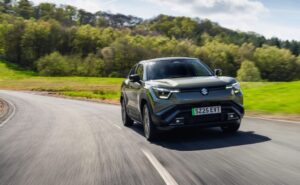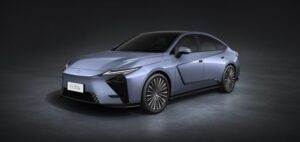Porsche has announced its next-generation Cayenne will become the first production car with factory-backed wireless charging when it launches in late 2025.
The German automaker’s Porsche Wireless Charging (PWC) system lets drivers park over an induction pad and charge at up to 11kW without plugging in cables. The system works like smartphone wireless charging but scaled up for cars.
Owners simply drive into a parking space equipped with a ground-mounted charging plate. A receiver plate mounted under the Cayenne aligns with the ground unit using the car’s surround view cameras.
Once positioned correctly, the SUV lowers on its air suspension and charging begins automatically.
How the Technology Works
The system transfers energy through magnetic fields between transmitter and receiver coils. This AC power gets converted to DC by an onboard rectifier before storing in the battery.
Porsche says the wireless charging operates at 90% efficiency and won’t be affected by leaves or snow on the pad.
Safety features include motion detection and foreign object sensors that stop charging if anything gets between the plates – preventing harm to pets or wildlife.
The charging pad measures 117cm by 78cm, stands 6cm tall, and weighs 50kg. It connects directly to mains power like traditional wallboxes and can be installed in garages, carports, or outdoor parking spaces.
Enhanced Charging Capabilities
Beyond wireless charging, Porsche confirmed the new Cayenne will be its fastest-charging EV yet at up to 400kW. That’s significantly higher than the current Taycan’s 320kW capability and the Macan EV’s 270kW.
The wireless system includes internet connectivity for remote control through the Porsche app. Owners can start, stop, and schedule charging sessions remotely.
“Ease of use, suitability for everyday use and charging infrastructure are still the decisive factors when it comes to the acceptance of electric mobility,” said Dr. Michael Steiner, Porsche’s board member for development.
He added that inductive charging makes electric cars more convenient than ever.
Real-World Charging Speeds
While Porsche advertises 11kW charging power, that requires three-phase power supply. Most UK homes have single-phase connections, limiting wireless charging to around 7kW – similar to standard wallboxes.
Three-phase power is common in some European countries but mainly restricted to commercial properties in Britain.
Porsche research indicates 75% of EV charging happens at home, making wireless technology particularly relevant for daily use. The company believes removing the need to plug in cables will make electric vehicles more appealing to mainstream buyers.
The wireless charging system represents Porsche’s latest effort to address common EV adoption barriers through improved convenience and user experience.





